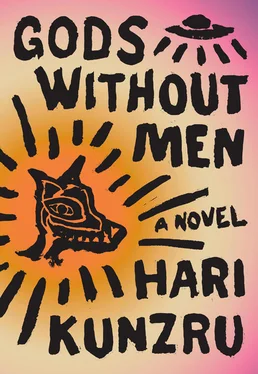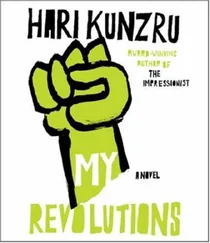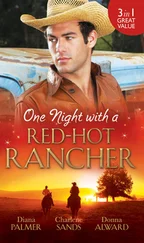All about them on the ground were signs of recent occupation. Footprints, spent cartridges, a couple of crushed beer cans. They walked on, making a circuit. In one sheltered spot they found the remains of a poured concrete platform, a base for some kind of structure. Its crumbling surface was blackened by fire.
“I’ve been here before,” said Lisa. “Except I’ve never been here.”
Jaz kicked a can. “Looks like someone had a party.”
He saw a yellowy glint on the floor and poked it with his toe, expecting broken glass. A rock, shot through with bright flecks. He picked it up and held it out.
“We’ve struck it rich.”
Lisa turned it over. “Is that gold?”
“Pyrites.”
Suddenly there was a huge crack, as if the sky had been broken open like an egg. Involuntarily they both ducked, putting their hands up to shield themselves. The crack became a long rolling roar and a fighter jet screamed overhead, just a few hundred feet above the desert floor. Within seconds it was just a dot, heading away over the mountains.
Lisa exhaled. “It felt like he was aiming for our heads. Are they even allowed to do that?”
“They can do what they like.”
“I bet Raj hated it.”
“He’s not making any noise.”
As they walked back to check on him, Jaz saw something wasn’t right. The stroller’s red hood was pushed back. The harness was undone.
“He can’t have gone far.” He said the words instinctively. Magical thinking, making it true. Lisa was already shouting for him. “Raj? Raj!” He joined in. “Raj? Raju? Where are you?”
Hoping to get a better view, Jaz climbed a little way up the big rock and shielded his eyes, trying to spot movement among the bushes. Lisa was heading to the far side of the rocks, cupping her hands to her mouth as she called out Raj’s name.
The emptiness was vast, inhuman.
“Jaz, over here!” He responded preconsciously to the tone of Lisa’s voice, scrambling down to the ground, running toward the sound. He found her on her hands and knees, peering into a crack in the earth, a kind of hollow that led down under the rock.
“Is he in there?”
“I’m not sure. Raj? Raj?”
Jaz got down onto his belly and wormed partway into the hole to peer into the blackness. All he could see was a broken bottle and a tangle of rusty fencing wire. The hole seemed to be choked with loose stones and brush.
“We need a light.”
“I don’t have anything.”
“There must be one in the car. A flashlight. Isn’t there an emergency kit or something?”
“I don’t know. I don’t think so.”
“Well, go check!”
“It’s a half-hour back down the trail.”
“Raju! Raj! Damn, I can’t see a thing.”
“Raj! Come to Mommy.”
Jaz tried to crawl farther into the hole. There was nothing to be seen, just rocks and beer cans and a bad smell, as if some animal had made it a lair. A coyote? Too late, he thought about snakes and came scrambling back to the surface, breathing heavily.
“I don’t think he’s down there. It doesn’t go very far. It’s full of rubble.”
Lisa stood up and ran a few paces, shouting Raj’s name. Then she turned and ran in the opposite direction. Jaz couldn’t see her eyes behind her sunglasses. A sick feeling descended over him like a shroud. Something had happened, something that wasn’t going to come right.
They walked and shouted and walked and shouted, turning wider and wider circles around the rocks until their voices were hoarse in their parched throats and their clothes were coated in fine white dust. Even as his head spun and sweat soaked his back, Jaz felt as if an IV were pumping cold gel through his veins. The world was far away; he was trapped somewhere else, somewhere dead and bone-white, outside time and space. He thought perhaps he should look for prints, the ridged soles of a child’s sneakers, but any trace had been obliterated by his own tracks, crossing and recrossing the same ground.
His hands quivered and the skin under his eyes burned and above him a whirlwind came out of the north, a great yellow cloud with a fire infolding itself from the heart of it. Inside, hidden from view, were the airships, shadowing him as always, and inside them the cloven-footed airmen, their bodies sparkling like burnished brass. He turned his face upward, in case there should be a message or a hand tugging at a lock of his hair and lifting him up to Heaven, but there was no message and no hand, just a pull from behind as one of the mules in the train briefly lost its footing on the narrow path. He turned in the saddle to watch it right itself under its load of charcoal. The lead mule, the one he trusted with the fragile alembic and the flasks, fixed him with a yellow eye. He spat its curse right back in its long face and kicked his heels into the flanks of his nameless horse. Reluctantly, the spavined beast walked on. At length the cloud of light receded, and he was alone in the desert again, his skin prickling with little stars, the tips of his fingers throbbing as if held in scalding steam. Cry and moan, he muttered to himself. Cry and moan, Nephi Parr, for your God is a devouring fire.
Below him, the salt flat’s blinding white had softened to amber. The Panamints were scored by deep shadows, the flanks of the distant range the color of ripe peaches. It was, he thought, a lying color. There was no sweetness out there; the nearest water in that direction was thirty miles away. The fine white dust coated his clothes and skin, silting his eyebrows and the wiry hair on his arms. The whole plain had once been ocean and this was the origin of the great spectral sailing ships that plowed over it, lost souls eternally on the flood. Ghosted by the dust, he’d crossed before first light and started slipping and climbing over talus, and by the time the sun was overhead he’d made it up onto ancient dry land and was following the trail toward the notch of the pass as the metals in the rocks sang to him in their high glittering voices.
Another hour and the sun would dip. By God’s grace he’d reach the Lost Promise before dark. Not that the night held any terrors for him, teem though it did with every form of creeping thing, for he was the moon’s representative in that still country, ambassador of change and transformation. The day he first rode into it, following Porter Rockwell the Danite, Christ’s blood had streamed in carmine ribbons across the sky and the sun had hammered inside his skull, and there had been great wrath and majesty and many deceptions of mind and eye. He’d been a young man, one of nine, covenanted to pray and never cease to pray to Almighty God to avenge the murder of their Prophet upon the Nation, all sworn that they would teach the same to their children and their children’s children unto the third and fourth generation. They had ridden down out of the Sierras like a terrible swift sword, their hearts filled with love.
He took a swig of warm water from his canteen, as a figure appeared on the ridge and raised its hand. It wasn’t long before he could see the shacks and the pile of tailings by the mouth of the mine. The older of the two German brothers took the horse’s bridle and asked him in his halting English if he was well. He nodded and started to unload his gear, carefully lifting the iron flasks of quicksilver and stacking them in rows. The younger brother was working the arrastra, whipping four bony mules as they dragged the heavy grindstones over the crushed ore in the circular bed. He peered at the blue-black grit. It was the consistency of fine sand. They must have been walking the circuit several days to grind it down so far.
“You add water today?”
The young German shook his head.
“You ought to. It’s dry.”
Читать дальше












